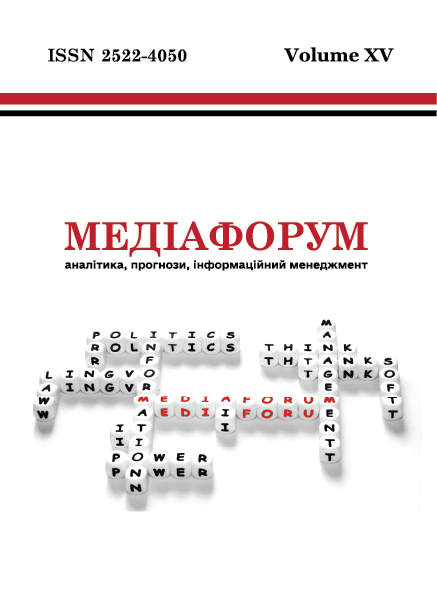Scientific Approaches to Studying the Role of Modern Technologies in International Relations
DOI:
https://doi.org/10.31861/mediaforum.2024.15.155-170Keywords:
technology, neural networks, artificial intelligence, decision-making, international relations, international relations theory, digital transformation of the public sphereAbstract
Over the past decade, several technological “quantum leaps” have simultaneously reshaped both international politics and the scholarly interpretation thereof. Contemporary debates concerning the incorporation of technology into the analysis of international relations point to three interrelated major trends. The first trend challenges the prevailing technological determinism and the practice of treating technology as a discrete variable that remains “outside” the core discussion. The second trend reflects a heightened emphasis on theoretical constructs derived from the sociology of technology and science. The third trend involves a methodological shift toward qualitative, empirically grounded field research.
This article proposes examining the societal challenges posed by artificial intelligence from the perspective of long-term sociotechnical transformation, in order to hypothesize which changes might ensue from society’s “use” of these technologies. In contrast to most current social science debates focusing on near-term effects and risks, our approach centers on the normalization processes of artificial intelligence over a longer horizon. Much like the gradual integration of mechanical time measurement into everyday life, this normalization unfolds as a (often contested) interplay between technological capabilities and the social consequences anticipated to arise from them. The subsequent analysis concentrates on the realm of social self-organization, namely democratic practices.
Downloads
References
The Whitehouse (2016) The Administration’s Report on the Future of Artificial Intelligence. https://obamawhitehouse.archives.gov/blog/2016/10/12 /administrations-report-future-artificial-intelligence
Scott B., Heumann S., and Lorenz P. (2018) Artificial intelligence and foreign policy. Stiftung Neue Verantwortung Policy Brief. https://www.stiftung-nv.de/sites/default/files/ai_foreign_policy.pdf
BABAJIDE A. J. (2024) Transformative role of artificial intelligence in global communication: minimising misinformation, disinformation, cultural diversity and fostering global understanding. https://journals.lasued.edu.ng /index .php/LAJOCSE/article/view/97/103
Mazarr M.J. et al. (2018) Understanding the Emerging Era of International Competition: Theoretical and Historical Perspectives. Santa Monica, CA: RAND Corporation. https://www.rand.org/pubs/research_reports/RR2726.html
Kurbalija J (2017) The impact of (big) data on geopolitics, negotiations, and the diplomatic modus operandi. Diplo blog, 19 May. 39. https://www.diplomacy.edu/blog/impact-big-data-geopolitics-negotiations-and-diplomatic-modus-operandi
German Federal Government (2018) Artificial Intelligence Strategy. https://www.ki-strategie-deutschland.de/home.html
Heumann S. (2018) Nationale KI-Strategien in EU und USA: Wie positioniert sich die KI-Enquete? https://www.stiftung-nv.de/sites/default/files/folien _heumann_ki_enquete.pdf
Strategic Council for AI Strategy (2017) Artificial Intelligence Technology Strategy, https://www.nedo.go.jp/english/activities/ZZCA_100014.html
United Nations (2018) UN Secretary-General’s Strategy on New Technologies. http://www.un.org/en/newtechnologies/images/pdf/SGs-Strategy-on-New-Technologies.pdf
Friend T. (2018) How frightened should we be of A.I.? The New Yorker, 14 May. https://www.newyorker.com/ magazine/2018/05/14/how-frightened-should-we-be-of-ai
Bjola C. (2021) Trends and Counter-Trends in Digital Diplomacy. https://www.swp- berlin.org/publications/products/arbeitspapiere/WP_Diplomacy 21_No18_Corneliu_Bjola.pdf
Wagner D. and Furst K. (2018) AI and the international relations of the future. International Policy Digest blog, 12 August. https://intpolicydigest.org/2018 /08/12/ai-and-the-international-relations-of-the-future
Brown J. & Lorenz P. (2017). The Future of Work and the Trans-Atlantic Alliance. Bertelsmann Foundation North America, Washington, D.C. and Stiftung Neue Verantwortung, Berlin. Available at: https://www.stiftung-nv.de/sites/default/files/the_future_of_work_the_trans.pdf.
König P. D. & Wenzelburger G. (2021), Between technochauvinism and human‑centrism: Can algorithms improve decision‑making in democratic politics?, https://link.springer.com/article/10.1057/s41304-020-00298-3














